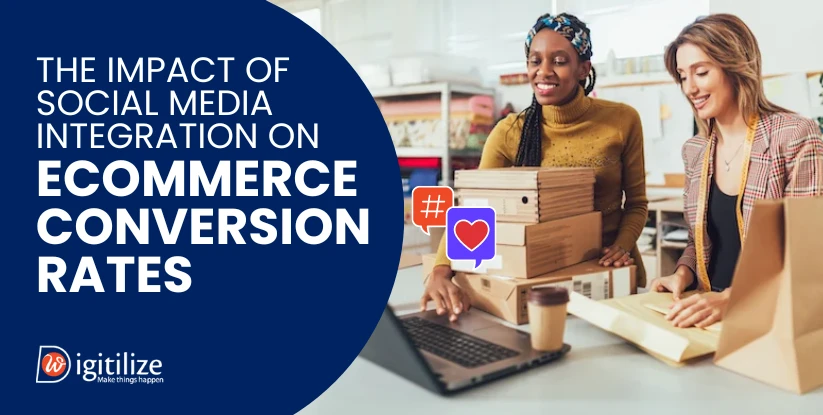The Impact of Social Media Integration on Ecommerce Conversion Rates
 4.9 billion of the 8 billion people on the planet use social media. That is a large number of chances to present your brand to prospective clients. Businesses everywhere are aware of this. It is the reason for the sustained growth of the social media marketing sector throughout time. That’s why we need to understand the impact of social media integration on ecommerce conversion rates.
On social networking, ecommerce companies may locate their target customers. It all comes down to understanding your target audience, the platforms they use, and the most effective ways to reach them with your content and advertisements. So, given that social media piques the interest of a wide audience, social media marketing may be quite advantageous for an e-commerce company. A lot of individuals doubt that using social media for the company will benefit them. Actually, it provides your brand with countless commercial advantages. Hence, let’s talk about a few benefits of social commerce.
4.9 billion of the 8 billion people on the planet use social media. That is a large number of chances to present your brand to prospective clients. Businesses everywhere are aware of this. It is the reason for the sustained growth of the social media marketing sector throughout time. That’s why we need to understand the impact of social media integration on ecommerce conversion rates.
On social networking, ecommerce companies may locate their target customers. It all comes down to understanding your target audience, the platforms they use, and the most effective ways to reach them with your content and advertisements. So, given that social media piques the interest of a wide audience, social media marketing may be quite advantageous for an e-commerce company. A lot of individuals doubt that using social media for the company will benefit them. Actually, it provides your brand with countless commercial advantages. Hence, let’s talk about a few benefits of social commerce.
What Does Social Media Mean for Marketing eCommerce?
Social media helps businesses create a stronger online presence, generate leads, and drive more traffic—all of which are critical functions of social media in Internet marketing. A well-thought-out social media strategy is essential to the growth and success of an online store. Businesses may benefit greatly from social media use. By integrating social media with e-commerce, it enhances customer relationship. So, its ability to gather information facilitates market research and marketing effort focus. Social media’s global financial success has led to its ongoing rise in popularity. Additionally, when it comes to ecommerce, social media boosts sales, advertises certain user-generated content for UK ecommerce, fosters community growth and conversation, and increases brand visibility.Advantages of social media for ecommerce
-
Learn more about the behaviour of consumers
-
Boost the reputation of your brand
-
Boost SEO outcomes
-
Increase audience participation.
-
Getting the Word Out about Your Products
 Increasing awareness, drawing clients, and boosting UK ecommerce sales via social media all depend on your product promotion. Determine what makes your items unique from those of your competitors. When promoting your items, identify the salient characteristics, advantages, or features that set them apart and highlight them. Make sure your product descriptions are clear, and concise, and emphasise the features and advantages of your offerings. Give a clear explanation of how your items can meet the demands of your clients or solve an issue. Hence, this is the impact of social media integration on ecommerce conversion rates. An important part of product advertising is the use of visuals. Employ photos or films of the highest calibre that highlight your items from various perspectives and illustrate how they are used.
Increasing awareness, drawing clients, and boosting UK ecommerce sales via social media all depend on your product promotion. Determine what makes your items unique from those of your competitors. When promoting your items, identify the salient characteristics, advantages, or features that set them apart and highlight them. Make sure your product descriptions are clear, and concise, and emphasise the features and advantages of your offerings. Give a clear explanation of how your items can meet the demands of your clients or solve an issue. Hence, this is the impact of social media integration on ecommerce conversion rates. An important part of product advertising is the use of visuals. Employ photos or films of the highest calibre that highlight your items from various perspectives and illustrate how they are used.
-
Listening Socially
-
Cooperation and Joint Ventures
Ecommerce Social Media Strategies
 Social networking tactics for ecommerce may improve your company and increase revenue. To maximize your outcomes, never forget to modify your strategy by the particular requirements of your target market, keep abreast of social media trends, and routinely assess the effectiveness of your tactics. The following are a few successful social media tactics for eCommerce:
Social networking tactics for ecommerce may improve your company and increase revenue. To maximize your outcomes, never forget to modify your strategy by the particular requirements of your target market, keep abreast of social media trends, and routinely assess the effectiveness of your tactics. The following are a few successful social media tactics for eCommerce:
-
Listening Socially
-
Engage in Conversation with Influencers
-
Developing deals and rebates
-
Innovative Design for Communication
-
Put User-Generated Content Strategies into Practice
How To Use Social Media to Promote Ecommerce
 There isn’t just one right technique to use social media for online sales. Your audience, the kind of business you operate, and the goods and services you offer will all influence your social media marketing approach.
Yet, after examining some of the top firms on the internet, we discovered that utilizing these best practices will greatly enhance your social media marketing efforts in order to manage a profitable ecommerce business:
There isn’t just one right technique to use social media for online sales. Your audience, the kind of business you operate, and the goods and services you offer will all influence your social media marketing approach.
Yet, after examining some of the top firms on the internet, we discovered that utilizing these best practices will greatly enhance your social media marketing efforts in order to manage a profitable ecommerce business:
-
Improve your bio’s “about” section
-
Create a shoppable link in your bio
-
Use material created by users as social proof
-
Buttons for Social Media Icons
-
Click to Follow and Share Buttons
FAQ
Frequently Asked Questions
Many different types of businesses can gain from social commerce, but its efficacy may differ based on the target market and the supply of goods and services. You'll have better success with social commerce if your target market is tech-savvy and predominantly engaged on social media.
Common examples of social commerce features are shoppable posts, social media marketplaces, live-streaming shopping events, and social referral programmes.
Alternatively, you can also copy and paste your social media links straight into your theme editor's Social Media area. To accomplish this, go to your Shopify admin, pick Online Store > Themes > Customise, then choose Theme Settings > Social network. Enter the URLs to your social network accounts there.
Instagram advertising has an average conversion rate of 1.08%.
According to conventional thinking, a decent conversion rate is between 2% and 5%. Reaching 4% feels like a huge increase if you're currently at 2%.
Divide the total number of visits by the number of conversions to get the conversion rate. For instance, the conversion rate of an ecommerce website with 200 monthly visitors and 50 purchases would be 25 percent, or 50 divided by 200.

